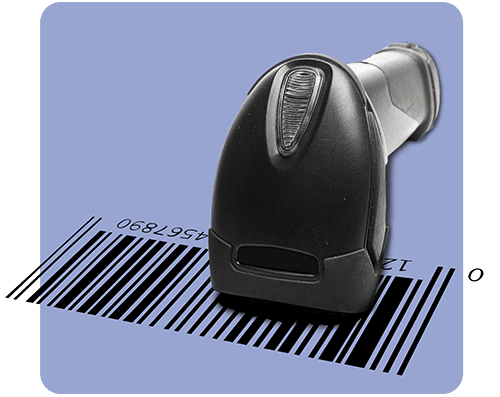Portable Barcodes Scanners for Effortless Inventory Tracking Anywhere
Portable Barcodes Scanners for Effortless Inventory Tracking Anywhere
Blog Article
Picking the Right Barcode Scanner for Your Service Demands
Choosing the proper barcode scanner for your service needs a nuanced understanding of your details operational demands and ecological problems. Elements such as scanner type, speed, and compatibility with existing systems play a critical duty in figuring out the ideal option.
Comprehending Barcode Scanner Types
When it pertains to picking a barcode scanner, recognizing the numerous types offered is essential for meeting specific organization needs. Barcode scanners can be classified into numerous types, each developed for different applications and settings.
Portable scanners are one of the most usual, using mobility and convenience of usage, making them appropriate for retail and inventory management. They commonly attach using USB or Bluetooth, offering flexibility in procedure. Fixed-mount scanners, on the other hand, are made for high-volume scanning applications, typically found in setting up lines or check out counters. These scanners are installed in a stationary placement, permitting quick scanning of several things in succession.
Another type is the mobile computer, which incorporates scanning abilities with calculating power. These devices are perfect for field operations or storehouse administration, allowing information collection and real-time inventory monitoring. In addition, there are commercial scanners that are built to hold up against severe atmospheres, such as severe temperature levels or direct exposure to dirt and moisture.

Trick Features to Think About
What vital functions should organizations focus on when picking a barcode scanner? Primarily, scanning rate is important, as faster scanners improve functional effectiveness, especially in high-volume atmospheres. The scanner's ability to check out numerous barcode layouts is also vital; guarantee it supports preferred types like QR codes, UPC, and Code 128 to suit varied inventory products.
Durability is an additional crucial feature, particularly for companies in rugged settings. Seek versions that are built to withstand drops, dust, and moisture. Additionally, consider the connectivity alternatives readily available; whether you prefer USB, Bluetooth, or Wi-Fi, the right connectivity can improve assimilation with existing systems.

Analyzing Your Business Setting
To efficiently select a barcode scanner, businesses have to analyze their certain operational setting. This analysis consists of assessing the physical format of the work area, the nature of the items being checked, and the typical problems under which scanning occurs. For example, a retail atmosphere might call for handheld scanners that can quickly process transactions at the check out, while a warehouse setting may benefit from ruggedized scanners designed to sustain harsher conditions.
In addition, think about the quantity of scanning needed. High-throughput environments might require sophisticated scanning innovations, such as fixed-position scanners or mobile phones that can operate effectively in hectic circumstances. The assimilation capacities with existing inventory monitoring systems likewise play an essential function; make sure the picked scanner can effortlessly get in touch with software systems being used.
Furthermore, examine the potential for growth and scalability. A scanner that meets existing demands could not be adequate as company expands. By extensively assessing these aspects, services can choose a barcode scanner that not just fulfills immediate requirements but likewise sustains long-term operational effectiveness and flexibility. This official source calculated strategy eventually adds to smoother procedures and improved efficiency.
Budgeting for Your Scanner
Having evaluated the operational environment and recognized the specific demands for a barcode scanner, the next step involves cautious budgeting to make sure a wise monetary investment. Developing a spending plan starts with figuring out the overall expenses connected with the scanner, including preliminary acquisition rate, operational expenditures, and prospective maintenance costs.
When selecting a barcode scanner, consider the series of available alternatives, from handheld tools to fixed-position scanners, as prices can vary dramatically. It is necessary to balance expense with capability; going with a much more budget friendly model may result in raised operational inefficiencies if it does not fulfill your service demands.
In addition to the equipment, factor in costs associated to software, training, and prospective upgrades. While it might important site be alluring to reduce upfront expenditure, purchasing a top quality scanner that aligns with your operational requirements can yield long-lasting savings through improved effectiveness and lowered downtime.
Finally, consider the complete expense of ownership, which incorporates the scanner's life expectancy and potential resale value. By carefully intending your budget plan, you can make certain that your investment in a barcode scanner will improve your operational productivity and economic efficiency.
Combination With Existing Equipment
Incorporating a barcode scanner with your existing systems is critical for maximizing its performance and making certain smooth procedures. barcodes scanners. A well-integrated scanner boosts workflow effectiveness, reduces errors, and increases data processing. When selecting a barcode scanner, consider compatibility with your existing software and equipment framework, including your stock administration systems, point-of-sale (POS) systems, and business resource preparation (ERP) remedies
Evaluate whether the scanner uses typical protocols such as USB, Bluetooth, or Wi-Fi, which can facilitate very easy assimilation. Furthermore, examine whether the scanner's software uses APIs or SDKs that permit for modification and integration with proprietary systems. This is specifically vital for services with special functional needs.
As your business expands, your systems must be able to suit added scanners and deal with increased information volumes without significant reconfiguration. Inevitably, spending in a barcode scanner that flawlessly integrates with your existing systems will certainly yield long-term benefits, enhancing accuracy, efficiency, and general efficiency within your operations.

Final Thought
In final thought, selecting an more ideal barcode scanner necessitates a comprehensive analysis of different factors, including scanner types, important attributes, and the certain service atmosphere. The appropriate barcode scanner offers as a crucial device in simplifying procedures and helping with reliable supply monitoring.
Report this page